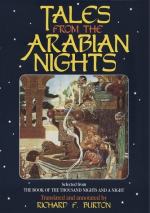cannot see if he has taken anything,” replied
she. “This is the first of the month,”
said the King, “come and let us see if it is
missing.” He then went with a large company
to the building where the book was kept. Alka
turned away from the King for a moment to say to Saif,
“Do not enter with us, for if you enter, the
case will open of itself, and the book will fall into
your hands. This would at once betray you, and
you would be seized and put to death, and all my labour
would have been in vain.” She then left
him, and rejoined the King. When they reached
the building, the doors were opened, and when the
King entered, they found the book. They immediately
paid it the customary honours, and protracted this
species of worship, while Saif stood at the door,
debating with himself whether to enter or not.
At last his impatience overcame him, and he entered,
and at the same instant the casket was broken to pieces,
and the book fell out. The King then ordered
all to stand up, and the book rolled to Saif Zul Yezn.
Upon this all drew their swords, and rushed upon him.
Saif drew his sword also, and cried “God is
great!” as Shaikh Gyat had taught him.
He continued to fight and defend himself, and struggled
to reach the door. The entire town arose in tumult
to pursue him, when he stumbled over a dead body,
and was seized. “Let me not see his face,”
cried the King, “but throw him into the mine.”
This mine was eighty yards deep, and had not been
opened for sixty years. It was closed by a heavy
leaden cover, which they replaced, after they had
loaded him with chains, and thrown him in. Saif
sat there in the darkness, greatly troubled, and lamenting
his condition to Him who never sleeps. Suddenly,
a side wall of the mine opened, and a figure came
forth which approached and called him by his name.
“Who are you?” asked Saif. “I
am a woman named Akissa, and inhabit the mountain where
the Nile rises. We are a nation who hold the
faith of Abraham. A very pious man lives below
us in a beautiful palace. But an evil Jinni named
Mukhtatif lived near us also, who loved me, and demanded
me in marriage of my father. He consented from
fear, but I was unwilling to marry an evil being who
was a worshipper of fire. ‘How can you
promise me in marriage to an infidel?’ said I
to my father. ‘I shall thereby escape his
malice myself,’ replied he. I went out
and wept, and complained to the pious man about the
affair. ‘Do you know who will kill him?’
said he to me, and I answered, ‘No.’
’I will direct you to him who has cut off his
hand,’ said he. ’His name is Saif
Zul Yezn, and he is now in the city of King Kamrun,
in the mine.’ Thereupon he brought me to
you, and I come as you see me, to guide you to my country,
that you may kill Mukhtatif, and free the earth from
his wickedness.” She then moved him, and
shook him, and all his chains fell off. She lifted
him on her shoulders, and carried him to the palace
of the Shaikh, who was named Abbas Salam. Here




